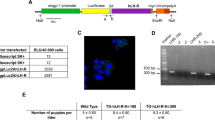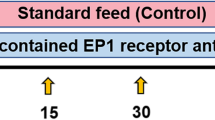Abstract
In order to determine whether mammary gland differentiation, which is known to protect this organ from chemically induced carcinogenesis, can be stimulated in virgin rats by administration of a progestagenic agent, medroxyprogesterone acetate (MPA) was given to 300 Sprague-Dawley virgin rats, which at the ages of 45, 55, 65 and 75 days, groups I, II, III and IV respectively, had implanted an MPA pellet of 0.5 mg (low dose-LD) or 5.0 mg (high dose-HD). Pellets were removed after 21 days, and 21 days later five animals per group were killed for evaluation of mammary gland development. The remaining animals received 8 mg 7,12-dimethylbenz(a)-anthracene (DMBA) per 100 g body weight, and were killed after 24 weeks for evaluation of tumour incidence. Both age and treatment affected mammary gland structure and had a significant interaction in the proportion of terminal end buds (TEBs) present. The number of TEBs decreased as a function of age; treatment at both LD and HD did not modify the proportion of TEBs in groups I and III; LD decreased their percentage in group II, and both doses markedly increased TEB percentage in group IV animals. MPA LD treatment did not affect overall tumour and adenocarcinoma incidence although group IV animals developed greater incidences than their respective controls. MPA HD treated rats were 2.45 times more likely to develop tumours than their respective controls. Adenocarcinoma incidence had a significant positive correlation with the percentage of TEBs present. It was concluded that this progestagenic agent did not increase the risk of carcinoma development when administered to virgin rats at the clinical dose used for contraception. However, a 10-fold dose increase resulted in a higher tumorigenic response.
This is a preview of subscription content, access via your institution
Access options
Subscribe to this journal
Receive 24 print issues and online access
$259.00 per year
only $10.79 per issue
Buy this article
- Purchase on Springer Link
- Instant access to full article PDF
Prices may be subject to local taxes which are calculated during checkout
Similar content being viewed by others
Author information
Authors and Affiliations
Rights and permissions
About this article
Cite this article
Russo, I., Gimotty, P., Dupuis, M. et al. Effect of medroxyprogesterone acetate on the response of the rat mammary gland to carcinogenesis. Br J Cancer 59, 210–216 (1989). https://doi.org/10.1038/bjc.1989.43
Issue Date:
DOI: https://doi.org/10.1038/bjc.1989.43



